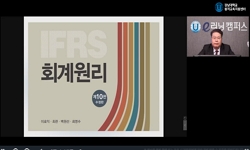We examine the use of accounting information, in particular earnings, as performance measures in executive compensation contracts. This study is partly motivated by the argument that the usefulness of accounting information has declined in recent year...
http://chineseinput.net/에서 pinyin(병음)방식으로 중국어를 변환할 수 있습니다.
변환된 중국어를 복사하여 사용하시면 됩니다.
- 中文 을 입력하시려면 zhongwen을 입력하시고 space를누르시면됩니다.
- 北京 을 입력하시려면 beijing을 입력하시고 space를 누르시면 됩니다.

경영자 보상계약에서 회계성과지표의 사용: 시계열적 변화를 중심으로 = The Use of Accounting Performance Measures in Executive Compensation Contracts: Evidence on Time-Series Changes
한글로보기https://www.riss.kr/link?id=A108190345
- 저자
- 발행기관
- 학술지명
- 권호사항
-
발행연도
2022
-
작성언어
Korean
- 주제어
-
등재정보
KCI등재
-
자료형태
학술저널
- 발행기관 URL
-
수록면
97-126(30쪽)
-
KCI 피인용횟수
0
- 제공처
-
0
상세조회 -
0
다운로드
부가정보
다국어 초록 (Multilingual Abstract)
We examine the use of accounting information, in particular earnings, as performance measures in executive compensation contracts. This study is partly motivated by the argument that the usefulness of accounting information has declined in recent years (Lev and Gu 2016; Lev 2018). Such argument is often supported by empirical evidence of declines in the relation between stock returns and earnings (i.e., value relevance) in recent years. However, value relevance does not tell whether the usefulness of accounting information in contracts has also decreased. This is an important issue given the extensive use of accounting information in firms’ contracts, such as debt contracts and executive compensation contracts. To test whether the usefulness of accounting information in executive compensation contracts has declined, we examine the time-series changes in the use of accounting information in CEO’s bonus contracts in the U.S. Specifically, we obtain the detailed data on CEOs’ annual bonus contracts from Incentive Lab, including specific performance measures used in determining annual bonus. We use 11,331 firm-years for the 2006-2019 period for our empirical analyses. We intend to provide descriptive evidence on the types of specific performance measures used on CEOs’ bonus contracts. We are particularly interested in providing evidence on the time-series changes in the use of performance measures in bonus contracts. The empirical findings can be summarized as follows. First, we document that the proportion of bonus in total compensation (e.g., 26% on average) has not changed significantly during the sample period, which suggests that annual bonus provides important incentives to top executives (Guay et al. 2019). Second, when we classify performance measures used in bonus contracts into accounting, stock price, and other information, we find that almost all firms (i.e., 98.6%) use accounting performance measures in CEOs’ annual bonus contracts. We also note that the proportion of firms using stock prices is very low at 1.7%. Third, over 90% of the contracts use some forms of earnings as performance measures, and the proportion of firms using earnings in bonus contracts has not substantially changed during the sample period. The proportion of firms using sales or cash flows as a performance measure has increased steadily. Fourth, when we classify earnings-related measures into six categories based on specific items on the income statement, we find that the use of EPS (earnings per share) or net income has declined sharply, whereas the use of EBITDA (earnings before interest, taxes, depreciation, and amortization) has tripled during the period. Fifth, we estimate the logistic regression to examine whether there are significant time-series changes in the use of individual performance measures in bonus contracts. We define a variable to measure the time trend, and we control for firm- and manager-specific characteristics in the model. Empirical results from the logistic regressions indicate that the use of sales and EBITDA has increased significantly during the sample period, while the use of EPS and net income has declined significantly. These results are generally consistent with the time-series patterns observed from the annual means. In additional tests, we examine time-series variations in the performance measures used in performance-vesting stock grants. We find that accounting information is widely used for performance-vesting stock grants, which is also observed for cash-based bonus pay. In terms of time-series changes, we find that the use of EPS has declined, while the use of other earnings (e.g., ROE (return on equity)) and EBITDA has increased during the sample period. We also examine the time-series variation in the performance measures used in cash bonuses based on the “relative” performance evaluation. The proportion of firms using accounting information is around 59%, while the proportion of firms us...
국문 초록 (Abstract)
본 연구는 미국 상장기업의 경영자 보상에 관한 구체적인 자료를 이용하여, 회계정보, 특히 이익이 최고경영자 보상계약에서 성과지표 로 어떻게 사용되는지 분석한다. 2006-2019년 기간 동안 ...
본 연구는 미국 상장기업의 경영자 보상에 관한 구체적인 자료를 이용하여, 회계정보, 특히 이익이 최고경영자 보상계약에서 성과지표 로 어떻게 사용되는지 분석한다. 2006-2019년 기간 동안 11,331 회사-연도 관측치를 분석한 결과, 거의 모든 기업이 보너스 계약에서 회계성과 지표를 사용하고 있었으며, 90% 이상의 기업이 이익을 성과지표의 하나로 사용하고 있었다. 이익이 보너스 계약의 성과지표로 사용되는 비중 은 표본기간 중 큰 변동이 없었으나, 매출액을 성과지표로 사용하는 비중은 꾸준히 증가하였다. 이익을 세부항목으로 분류하여 분석한 결과, EPS 또는 당기순이익 등 최종이익이 성과지표로 사용되는 비중이 표본기간 중 크게 감소한 반면, EBITDA의 사용빈도는 세 배 이상 증가하였 다. 반면, 세전이익이나EBIT가 성과지표로 사용되는 비중은 큰 변화가 없었다. 추가분석에서는 성과연동형 양도제한부 주식보상과 상대평 가제도에 기반한 보너스 계약에서 사용되는 성과지표의 시계열적 변화를 검토하였으며, 금융 및 비금융기업이 사용하는 성과지표의 차이도 분석하였다. 본 연구는 최고경영자의 보너스 계약에서 회계정보가 성과지표로써 활용되는 구체적인 행태에 대한 기술적인(descriptive) 분석 결과를 제시함으로써, 최근의 회의적 시각에도 불구하고, 회계정보가 경영자의 성과평가와 보상에 유용한 정보를 제공한다는 결과를 제시한 다. 또한, 성과지표로 사용되는 이익을 세분하여 최근10여 년간 시계열적 변화를 분석함으로써, 실무와 학계, 규제기관에 유의미한 시사점을 제공한다.
참고문헌 (Reference)
1 김유진 ; 안정인 ; 서윤석, "회계성과와 시장성과의 상대적 정보성이 이익반응계수 및경영자 보상에 미치는 영향- 외국인 및 국내 기관투자자별 차이 분석 -" 한국경영학회 47 (47): 963-989, 2018
2 이용훈 ; 홍철규, "회계 성과가 경영자 보상에 미치는 영향" 한국회계학회 23 (23): 229-266, 2014
3 이미주 ; 유해양 ; 황인태, "임원보수와 기업성과" 한국경영학회 49 (49): 523-557, 2020
4 홍철규, "경영진 보상에서 재무성과 정보성의 역할: 시장차이를 통한 분석" 한국회계학회 21 (21): 325-347, 2012
5 Drake, K, "The weight on earnings in incentive contracting: Dynamic response or status quo?" 2021
6 Curtis, A., "The use of adjusted earnings in performance evaluation" 26 (26): 1290-1322, 2021
7 Guay, W., "The role of executive cash bonuses in providing individual and team incentives" 133 (133): 441-471, 2019
8 Cadman, B., "The incentives of compensation consultants and CEO pay" 49 (49): 263-280, 2010
9 Lev, B, "The end of accounting and the path forward for investors and managers" John Wiley & Sons, Inc 2016
10 Lev, B, "The deteriorating usefulness of financial report information and how to reverse it" 48 (48): 465-493, 2018
1 김유진 ; 안정인 ; 서윤석, "회계성과와 시장성과의 상대적 정보성이 이익반응계수 및경영자 보상에 미치는 영향- 외국인 및 국내 기관투자자별 차이 분석 -" 한국경영학회 47 (47): 963-989, 2018
2 이용훈 ; 홍철규, "회계 성과가 경영자 보상에 미치는 영향" 한국회계학회 23 (23): 229-266, 2014
3 이미주 ; 유해양 ; 황인태, "임원보수와 기업성과" 한국경영학회 49 (49): 523-557, 2020
4 홍철규, "경영진 보상에서 재무성과 정보성의 역할: 시장차이를 통한 분석" 한국회계학회 21 (21): 325-347, 2012
5 Drake, K, "The weight on earnings in incentive contracting: Dynamic response or status quo?" 2021
6 Curtis, A., "The use of adjusted earnings in performance evaluation" 26 (26): 1290-1322, 2021
7 Guay, W., "The role of executive cash bonuses in providing individual and team incentives" 133 (133): 441-471, 2019
8 Cadman, B., "The incentives of compensation consultants and CEO pay" 49 (49): 263-280, 2010
9 Lev, B, "The end of accounting and the path forward for investors and managers" John Wiley & Sons, Inc 2016
10 Lev, B, "The deteriorating usefulness of financial report information and how to reverse it" 48 (48): 465-493, 2018
11 Ittner, C., "The choice of performance measures in annual bonus contracts" 72 (72): 231-255, 1997
12 Givoly, D., "The changing time-series properties of earnings, cash flows and accruals: Has financial reporting become more conservative?" 29 (29): 287-320, 2000
13 권세원 ; 김경원 ; 신재용 ; 정선문, "The Determinants of Pay-for-Performance Sensitivity and Convexity of CEO Bonus Contracts: Evidence from S&P 1500 Firms" 한국경영학회 49 (49): 183-214, 2020
14 Johnson, P. M., "Special items : A descriptive analysis" 25 (25): 511-536, 2011
15 Banker, R. D., "Sensitivity, precision, and linear aggregation of signals for performance evaluation" 27 (27): 21-39, 1989
16 Huang, R., "Revenue-expense matching and performance measure choice" 2022
17 Gong, G., "Relative performance evaluation and related peer groups in executive compensation contracts" 86 (86): 1007-1043, 2011
18 Core, J. E., "Price versus non-price performance measures in optimal CEO compensation contracts" 78 (78): 957-981, 2003
19 Bettis, J., "Performance-vesting provisions in executive compensation" 66 (66): 194-221, 2018
20 De Angelis, D, "Performance terms in CEO compensation contracts" 19 (19): 619-651, 2015
21 Huang, Y., "Performance measures in CEO annual bonus contracts" 2013
22 Hölmstrom, B, "Moral hazard and observability" 10 (10): 74-91, 1979
23 Core, J. E., "Market valuations in the new economy : An investigation of what has changed" 34 (34): 43-67, 2003
24 Banker, R., "Incentive contracting and value relevance of earnings and cash flows" 47 (47): 647-678, 2009
25 Drake, K., "Implementing relative performance evaluation : The role of life cycle peers" 32 (32): 107-135, 2022
26 Francis, J., "Have financial statements lost their relevance?" 37 (37): 319-352, 1999
27 Kim, S., "Executive bonus target ratcheting : Evidence from the new executive compensation disclosure rules" 34 (34): 1843-1879, 2017
28 Rozenbaum, O, "EBITDA and managers’ investment and leverage choices" 36 (36): 513-546, 2018
29 Bloomfield, M., "Cost shielding in executive bonus plans" 72 : 101428-, 2021
30 Bennett, B., "Compensation goals and firm performance" 124 (124): 307-330, 2017
31 Collins, D. W., "Change in the value-relevance of earnings and book values over the past forty years" 24 (24): 39-67, 1997
32 Bryan, S., "CEO stock-based compensation: An empirical analysis of incentive-intensity, relative mix, and economic determinants" 73 (73): 661-693, 2000
33 Bushman, R., "CEO compensation : The role of individual performance evaluation" 21 (21): 161-193, 1996
34 Murphy, K., "CEO bonus plans: And how to fix them" 2011
35 Choi, S., "Analyst forecasts and target setting in executive annual bonus contracts" 33 (33): 19-42, 2021
36 Lee, D. W, "Analysis of disclosure of executive compensation" 2015
37 Lambert, R., "An analysis of the use of accounting and market measures of performance in executive compensation contracts" 25 : 85-125, 1987
38 Sloan, R, "Accounting earnings and top executive compensation" 16 (16): 55-100, 1993
동일학술지(권/호) 다른 논문
-
- 한국회계학회
- 전경민
- 2022
- KCI등재
-
- 한국회계학회
- 김세희
- 2022
- KCI등재
-
- 한국회계학회
- 이성호
- 2022
- KCI등재
-
- 한국회계학회
- 임승연
- 2022
- KCI등재
분석정보
인용정보 인용지수 설명보기
학술지 이력
| 연월일 | 이력구분 | 이력상세 | 등재구분 |
|---|---|---|---|
| 2027 | 평가예정 | 재인증평가 신청대상 (재인증) | |
| 2021-01-01 | 평가 | 등재학술지 유지 (재인증) |  |
| 2018-01-01 | 평가 | 등재학술지 유지 (등재유지) |  |
| 2015-01-01 | 평가 | 등재학술지 유지 (등재유지) |  |
| 2011-01-01 | 평가 | 등재학술지 유지 (등재유지) |  |
| 2009-01-01 | 평가 | 등재학술지 유지 (등재유지) |  |
| 2007-01-01 | 평가 | 등재학술지 유지 (등재유지) |  |
| 2004-01-01 | 평가 | 등재학술지 선정 (등재후보2차) |  |
| 2003-01-01 | 평가 | 등재후보 1차 PASS (등재후보1차) |  |
| 2001-07-01 | 평가 | 등재후보학술지 선정 (신규평가) |  |
학술지 인용정보
| 기준연도 | WOS-KCI 통합IF(2년) | KCIF(2년) | KCIF(3년) |
|---|---|---|---|
| 2016 | 0.99 | 0.99 | 1.25 |
| KCIF(4년) | KCIF(5년) | 중심성지수(3년) | 즉시성지수 |
| 1.35 | 1.43 | 2.629 | 0.29 |




 KISS
KISS






